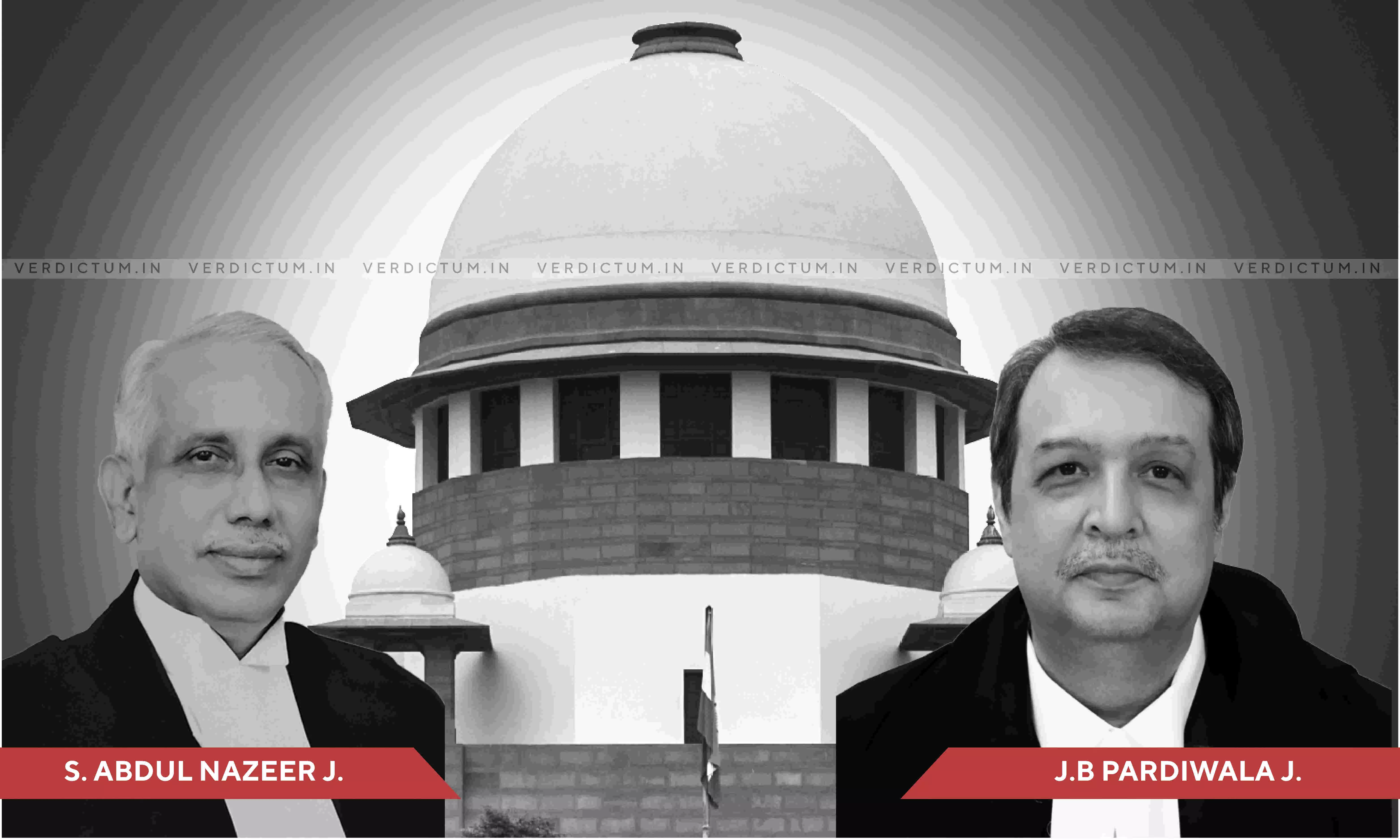
High Court's Inherent Power Is To Be Exercised Sparingly For Preventing Abuse Of Process Of Court & Secure Justice: SC
 |
|The Supreme Court while dealing with a criminal appeal filed by the appellant against the order passed by the Telangana High Court in which the court declined to quash criminal proceedings and rejected the application of the appellant under Section 482 of the CrPC held that the High Court's power is to be exercised sparingly and for prevention of abuse of the process of the court and secure the ends of justice.
The two-Judge Bench comprising Justice S. Abdul Nazeer and Justice J.B. Pardiwala stated –
"While exercising its jurisdiction under Section 482 of the CrPC, the High Court has to be conscious that this power is to be exercised sparingly and only for the purpose of prevention of abuse of the process of the court or otherwise to secure the ends of justice. Whether a complaint discloses a criminal offence or not, depends upon the nature of the act alleged thereunder. Whether the essential ingredients of a criminal offence are present or not, has to be judged by the High Court. A complaint disclosing civil transaction may also have a criminal texture. But the High Court must see whether the dispute which is in substance of a civil nature is given a cloak of a criminal offence. In such a situation, if civil remedy is available and is in fact adopted, as has happened in the case on hand, the High Court should have quashed the criminal proceeding to prevent abuse of process of court."
Advocate Abhijit Sengupta appeared on behalf of the appellant.
Brief Facts –
In this case, the respondent claimed to be the lawful owner of the open plot situated in Telangana as he had purchased the said plot of land by way of a sale deed executed in his favour. The appellant in the present case is one of the attesting witnesses. All the original documents of the plot in question remained in possession of the appellant as necessary permissions from different authorities were to be obtained.
The plot in question had been transferred in favour of a resident of the USA. The transfer took place by way of a sale deed and the appellant herein was shown as one of the attesting witnesses.
The respondent however stated that at no point in time he had executed any such sale deed and a bogus and concocted sale came to be created by the appellant herein in collusion.
He also submitted that his signature on the alleged sale deed has been forged as a part of the criminal conspiracy hatched by the appellant herein in collusion with the other co-accused.
A complaint was therefore lodged before the Additional Metropolitan Magistrate for the offences punishable under Sections 120-B, 420, 468, and 471 of the Indian Penal Code. The respondent had also thereafter instituted a suit in the District Court and the same is pending. Hence, the appellant went before the High Court and prayed for quashing the criminal prosecution but the same got declined.
Being dissatisfied with the order of the High Court, the appellant approached the Supreme Court by filing an appeal.
The Apex Court in this matter noted, "We fail to understand on what basis the police filed charge sheet against the appellant herein. If it is the case of the original complainant that a conspiracy was hatched, then in such circumstances why did the police drop the purchaser and the other individuals from the charge sheet stating that they are the bona fide purchasers of the plot in question for value without notice."
The Court also noted that as of date, there is no convincing legal evidence on record to put the appellant herein to trial for the alleged offences.
The Court while disagreeing with the High Court's decision observed, "It appears that the aforesaid aspects of the matter have been overlooked by the High Court. We are conscious of the fact that perfunctory investigation cannot be a ground either to quash the criminal proceedings or even to acquit the accused. We take notice of the fact that as on date the parties are before the Civil Court. The civil suit being the Original Suit No. 1343 of 2016 between the parties is pending wherein the contention of the complainant as a plaintiff is that no sale deed dated 29.12.2010 was executed, whereas the contention of the appellant herein as a defendant in the suit is that the sale deed had been executed by the complainant. The Civil Court is therefore seized of the question as regards the legality and validity of the disputed sale deed."
The Court further observed that it would not be proper to permit the complainant to prosecute the appellant on such an allegation when the validity of the sale deed is being tested before the Civil Court.
The Court said, "The police should have investigated whether the amount of Rs. 24,08,000/- (Rupees Twenty Four Lakhs Eight Thousand Only) was paid by AXIS Bank Ltd. directly to the original complainant (respondent No. 2 herein). There is no clarity even in this regard. This aspect shall also be looked into while deciding the civil suit between the parties."
The Court concluded that the question of the validity of the sale deed will have to be decided by the Civil Court after recording the evidence and hearing the parties in accordance with the law.
Accordingly, the Supreme Court allowed the appeal and set aside the order of the High Court.
Cause Title - R. Nagender Yadav v. The State Of Telangana And Anr.
Click here to read/download the Judgment